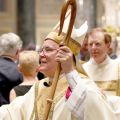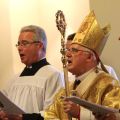The healing power of forgiveness
The other day, I finished a terrific page-turner and then picked up the newspaper to read about the latest attacks on the Christian faith, this time in Saskatchewan. They were two seemingly unrelated things that really got me thinking, searching deep down.
The book is best-seller Unbroken written by Laura Hillenbrand about a courageous American airman during the Second World War. If you’ve not read it, pick it up because it’s difficult to put down. But let’s talk about Saskatchewan first.
- By Robert Brehl
Pope’s early years marked by brotherly faith and love
ROME - With the papal birthday and anniversary last week, attention in Rome was understandably focused on reviewing the seven-year pontificate of Benedict XVI. I had the unexpected pleasure though of reading about the other end of the Holy Father’s life — the early years of his Bavarian youth.
Last year an interview book was published by Msgr. Georg Ratzinger, the pope’s older brother. They were ordained priests together in 1951 and have enjoyed a close relationship through the years. After his election as Pope, the younger brother, Joseph, was not able to travel to Germany to spend time with Georg, so now the monsignor comes several times a year to Rome to spend time with his little brother, the Pope. They had originally planned to retire together to their home in Regensburg, but the events of April 19, 2005, permanently altered that plan.
Step down, Bev Oda
International Development minister Bev Oda has defended large cuts in Canadian foreign aid by saying stricter accountability has created more efficiency in how taxpayer dollars are spent overseas. Sadly, the minister doesn’t seem to apply that same discipline to her own office.
Oda is the minister responsible for managing Canada’s $5 billion aid budget. It’s her job to sign off on which starving nations receive Canadian aid as well as how much money each receives. More than most Canadians, she is familiar with the misery of the world’s poor, or at least she should be. So it’s alarming to learn the Conservative minister approaches her important work with a let-them-eat-cake mentality.
Obvious to all but Fr. Gravel
Quebec’s euthanasia debate must be getting horribly confusing when even a Catholic priest doesn’t know the right answer to whether the practice should be legalized.
It must be doubly so when the priest is also a former MP who knows — or should know — that euthanasia can be made legal only by amending the federal Criminal Code.
Yet here was Fr. Raymond Gravel, the one-time Bloc Quebecois MP for a Montreal-area riding, musing about whether killing the elderly, the weak and the suffering might be just what the doctor ordered for Quebec’s health care system.
D&P still seeks to put the Gospel in action
The April 15 column by Brian Lilley celebrated the decision by the Canadian International Development Agency (CIDA) to reduce the traditional funding of the Canadian Catholic Organization for Development and Peace, funding that helps address hunger, poverty, violence and social injustice around the world. The decision will impact the struggle for development and justice of communities we support, leaving many unfinished projects in Latin America, Africa, Asia and the Middle East.
- By Ronald Breau
Pain is a great mystery that can bring us closer to Christ
Like all Catholics, I know on an intellectual level that Christ suffered for our sins and for our salvation. That is a fairly simple but profound statement about what Christ did for us through His passion.
But until recently I’ve been fortunate to never have to contemplate what that meant from a personal perspective. In other words, I never had to contemplate it in its painful, bloody reality and consider how a Christian should view personal suffering in light of Christ’s passion.
Then in December a minor back pain became a four-month ordeal that has not yet completely ended. At its worst, I was twisted into a knot of physical anguish that at points I thought would drive me insane, or kill me.
Rejoice in the day the Lord has made
OTTAWA - “I have never been in a church this big,” said one soon-to-be ex-Anglican priest to Archbishop Terrence Prendergast of Ottawa in the sacristy of St. Patrick’s Basilica on Divine Mercy Sunday.
The occasion was a solemn Mass in the “Anglican Use” to receive some 40 members of the Anglican Catholic Church of Canada into full communion with the Catholic Church. The several dozen new Catholics will form a quasi-parish that, while fully Catholic, will celebrate the Eucharist according to approved liturgical books which draw upon their Anglican heritage.
Fight for religious freedom
The right of religious freedom means much more than merely being allowed to hold faith beliefs and go to church. Those are essential, of course, but a society that truly endorses religious freedom goes further. It also allows citizens to outwardly live their faith through the public activities they take up and, equally important, through those their conscience informs them to avoid.
In defence of that traditional understanding of religious freedom, the U.S. Conference of Catholic Bishops issued a bold statement four days after Easter. Titled “Our first, most cherished liberty,” the 12-page document is a manifesto for religious freedom that is blunt, provocative, timely, commendable — and worthy of export beyond American borders. Canadians should take note.
What happened to the art of civil discourse?
No doubt, some people will be offended by this column. Seems whatever is said about Catholicism offends someone these days. Even the most benign comment is challenged. Instead of listening to and discussing other points of view, there is a tendency to shout at those who see things differently.
Think I am exaggerating? Take a quick spin on blogs, Facebook, Twitter, YouTube and elsewhere and you’ll easily find the shouting, name-calling and misunderstandings. (Just Google “Catholic faith arguments” or “contraception” or “women priests” as starting points and then simply click away.)
- By Robert Brehl
A nation’s story is not told only in politics
OTTAWA - About a month ago it was cardinals’ week here in the nation’s capital. Our chaplaincy at Queen’s University was hosting the visit to Canada of the archbishop of Bombay, Cardinal Oswald Gracias. Given that it was his first visit to our country, and that he was flying into Ottawa, it was arranged that he would visit Parliament. The Speaker of the Senate, Noel Kinsella, received him and gave him a tour of the red chamber and the speaker’s offices. Afterward, the Speaker of the House of Commons, Andrew Scheer, hosted a dinner in Cardinal Gracias’ honour.
Trampling on rights
Something unsettling is happening when conscience becomes a dirty word in a liberal democracy. Yet most Canadians seem unfazed by the increasing tendency to treat our fundamental right to freedom of conscience as if it were some unspeakable anti-social offence.
The denial of conscience rights to marriage commissioners in Saskatchewan, the obliteration of parental rights in Quebec, the imposition of state sexual ideology on Catholic schools in Ontario — these should all be causing deep concern. In none of these cases, after all, have the aggrieved parties taken the law into their own hands. They have not shouted fire in a crowded theatre, the time-honoured test of the limit of free speech. All they have sought is their Charter-protected right to be exempted from legal or regulatory obligations that violate their deepest and most sincerely held beliefs.











